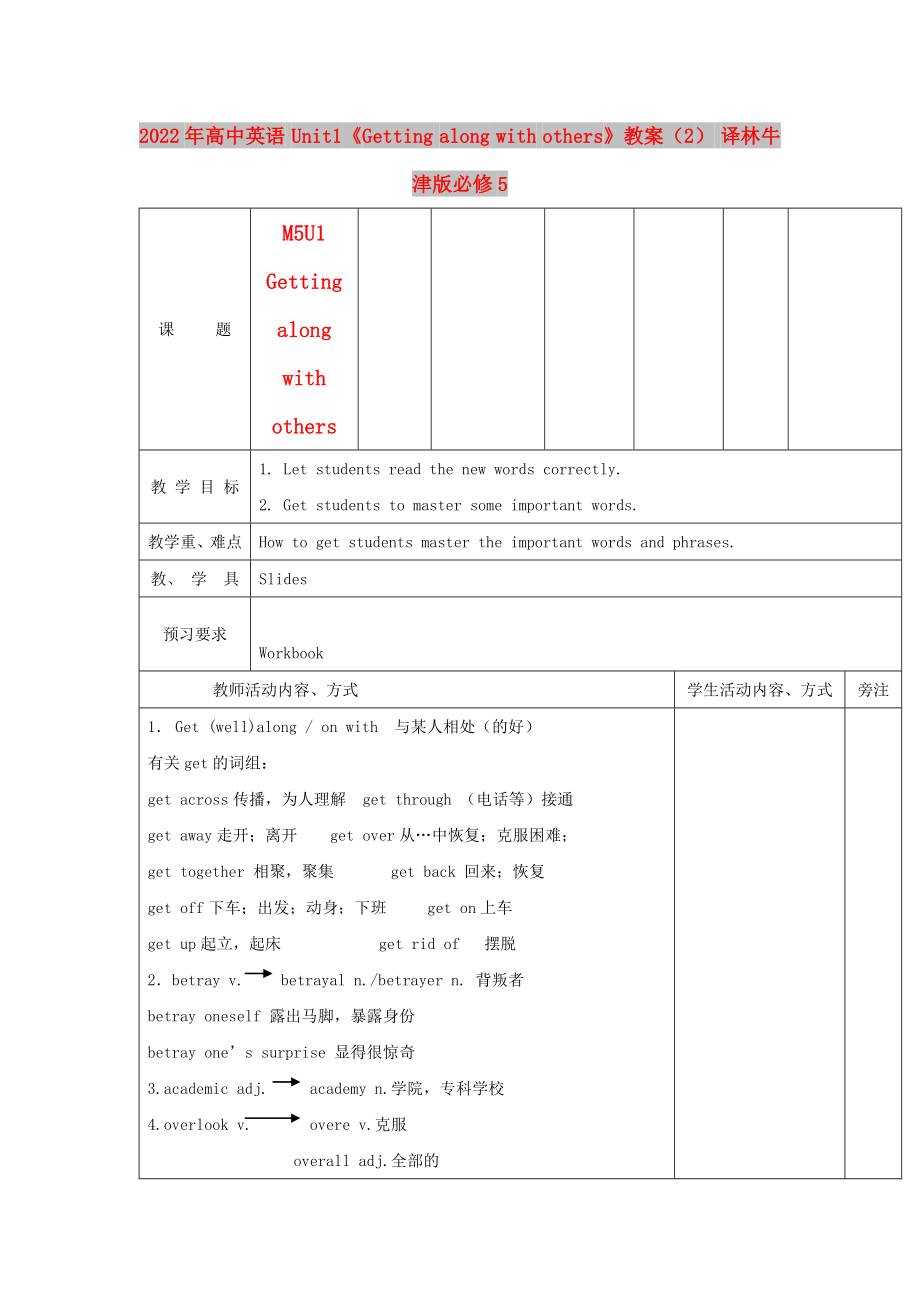《2022年高中英語(yǔ) Unit1《Getting along with others》教案(2) 譯林牛津版必修5》由會(huì)員分享����,可在線閱讀����,更多相關(guān)《2022年高中英語(yǔ) Unit1《Getting along with others》教案(2) 譯林牛津版必修5(4頁(yè)珍藏版)》請(qǐng)?jiān)谘b配圖網(wǎng)上搜索�����。
1�、2022年高中英語(yǔ) Unit1《Getting along with others》教案(2) 譯林牛津版必修5
課 題
M5U1 Getting along with others
教 學(xué) 目 標(biāo)
1. Let students read the new words correctly.
2. Get students to master some important words.
教學(xué)重���、難點(diǎn)
How to get students master the important words and phrases.
教���、 學(xué) 具
Slid
2、es
預(yù)習(xí)要求
Workbook
教師活動(dòng)內(nèi)容����、方式
學(xué)生活動(dòng)內(nèi)容、方式
旁注
1. Get (well)along / on with 與某人相處(的好)
有關(guān)get的詞組:
get across傳播�,為人理解 get through (電話等)接通
get away走開(kāi);離開(kāi) get over從…中恢復(fù)����;克服困難;
get together 相聚,聚集 get back 回來(lái)����;恢復(fù)
get off下車(chē);出發(fā)�;動(dòng)身;下班 get on上車(chē)
get up起立���,起床 get rid of 擺脫
2.betray
3��、 v. betrayal n./betrayer n. 背叛者
betray oneself 露出馬腳�,暴露身份
betray one’s surprise 顯得很驚奇
3.academic adj. academy n.學(xué)院����,專(zhuān)科學(xué)校
4.overlook v. overe v.克服
overall adj.全部的
5.cheerful adj. cheer v.使…歡呼&n.歡呼聲
cheer up!別灰心!高興起來(lái)���!振作起來(lái)�����!
6.admit的用法
1) admit 作“準(zhǔn)許進(jìn)入”���、“允許參加”解釋��。例如:
Open the
4�����、window to admit some fresh air.
2) admit 可作“承認(rèn)”解釋?zhuān)@時(shí)����,其后可跟名詞����、動(dòng)詞的-ing形式�����、賓語(yǔ)從句或賓語(yǔ)+賓語(yǔ)補(bǔ)足語(yǔ)����。例如:
John admitted knowing little about the subject.
3) admit of : 作“容許”解。如:
(1)This is a universal truth which admits of no exception.
4) admit to : 承認(rèn)����。
(1) I must admit to being ashamed for what had happ
5、ened.
7.deliberately adv. deliberate adj.
8.keep one’s word 保守諾言
有關(guān)word 的詞組
in other words 換句話說(shuō)have a word with與某人談話
receive(get/have)word得到消息
have words with sb.與某人吵架
get in a word插話in a(one)word總之
9.forgive-forgave-forgiven v.原諒
1).forgive的用法:
forgive sb.for sth因…原諒某人.
forgive sb’s sth
6�����、 原諒某人某事
forgive sb’s debt免除某人債務(wù)
2).區(qū)別excuse, pardon和forgive。
excuse, forgive, pardon 這三個(gè)詞都表示“原諒�����,寬恕”����。
excuse:“原諒”,指有意放過(guò)人們?cè)谏鐣?huì)���,習(xí)俗方面的具體行為���。如錯(cuò)誤,疏忽或失職���,不予以指責(zé)和懲罰����。常用詞組:excuse for原諒���;excuse from/to do免除����。如:
10.Tease:laugh at teaser n.愛(ài)戲弄?jiǎng)e人的人
Tease sb.嘲笑某人 tease sth.嘲笑某事 tease sb. about sth.嘲
7、笑某人某事
12.in trouble 有麻煩���,處于困難中
in hospital在住院 in store儲(chǔ)藏著�;準(zhǔn)備著
in prison在監(jiān)獄(服刑) in general 大體上(=generally)
in battle在戰(zhàn)斗中 in peace平平安安地(=peacefully)
in order井然有序 in secret秘密地(=secretly)
in danger在危險(xiǎn)中 in surprise驚奇地(=surprisely)
in doubt 感到懷疑 in public公開(kāi)地(=publicly)
in mon共有 i
8�����、n person親自(=personally)
in debt負(fù)債 in particular特別地(=particularly)
in sight看得見(jiàn) in silent無(wú)聲地(=silently)
12.Focus
1)n.重點(diǎn)�����,專(zhuān)注的地方�����;焦點(diǎn)�,關(guān)注點(diǎn)
2)v.集中注意力����;聚焦。后常接介詞on
13.a(chǎn)s a (the) result of …由于…的原因
as a result 結(jié)果�����;因此
result from因…而引起
result in 導(dǎo)致
e.g.He ate some bad watermelon.As a result,he felt il
9、l.
As a result of his carelessness,he hurt himself.
[提示]:as a result of接原因����,as a result接結(jié)果。
[拓展]:表原因的短語(yǔ):
due to由于��,因?yàn)?because of 因?yàn)閠hanks to多虧�;幸虧
owing to 歸因于
14.yell v.&n.吼叫,大叫 yell at sb.對(duì)某人叫喊
15.mean
1)adj刻薄的����、卑鄙的、吝嗇的
2)v.mean to do sth 打算做某事
mean doing sth.意味著…
be meant to do =be intended to do被打算用作…
16.guilty .adj. guilt [U]罪�,罪行
be guilty of 犯…的罪 be guilty for\about sth.內(nèi)
 2022年高中英語(yǔ) Unit1《Getting along with others》教案(2) 譯林牛津版必修5
2022年高中英語(yǔ) Unit1《Getting along with others》教案(2) 譯林牛津版必修5

